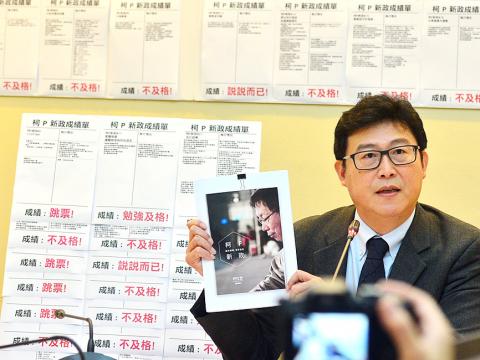Taipei Mayor Ko Wen-je (柯文哲) has broken eight of his 30 campaign promises and achieved only unsatisfactory results for another 14, Democratic Progressive Party (DPP) Legislator Pasuya Yao (姚文智) said yesterday, questioning Ko’s capability as mayor.
After Ko on Monday unveiled a report enumerating his achievements in office, Yao, who has announced his bid for Taipei mayor in next year’s local elections, called a news conference to review Ko’s three years in office.
Ko has failed to realize the i-Voting system, public participation in budgeting, social housing and subsidies, public long-term care services, public childcare services, music industry improvement, establishing cultural industry infrastructure and independent cultural policy formation process, Yao said.

Photo: Wang Yi-sung, Taipei Times
The mayor has failed to achieve tangible results in 14 other pledges, including improving on-campus food safety, reorganizing bus routes, initiating government-led urban renewal, establishing affordable kindergartens, improving community daycare services, improving police management and public security, building energy efficient infrastructures and improving the business environment, Yao added.
The i-Voting system, one of Ko’s principal policies, created an online polling platform allowing people to submit proposals on issues to be voted on by the public, but only 29 proposals have been voted via the platform, all of which were launched by government agencies, Yao said.
The system is designed to improve transparency in policymaking and government management, but the city government rejected all of the four resident-initiated proposals and refused to hold any public hearings about controversies surrounding the construction of the Taipei Dome, he added.
“While Ko has advocated transparency, his behind-the-door dealings in the Taipei Dome case and his boasting of a close relationship with top DPP officials have suggested his authoritarian mindset,” Yao said.
Ko’s proposal to build walls around government agencies against protesters following a protest on Saturday suggests that he “has forgotten how he gained power,” Yao added.
While Ko promised to build 50,000 public housing units in two terms, only 3,453 units can be completed by the end of his first term, while the availability of public housing remains low, Yao said.
Ko has pledged to increase public childcare capacity, but the city has only 18 public childcare centers serving 216 children, accounting for only 0.3 percent of children aged up to two in the city, he said.
Taipei had only 18 daycare centers serving 619 elderly people and 17 house care centers providing services to 3,724 people in the first half of this year, suggesting insufficient service capacity, Yao said.
While Ko has promised to shorten bus lines to make them more frequent and reliable, he has only increased the frequency of four popular bus lines without reorganizing bus traffic, he said.
“What can Ko’s administration guarantee other than imperfection and fraud?” Yao said.
Ko has achieved satisfying results in six policies, including establishing a family physician system and at-home medical services, which are associated with his background in medical practice, Yao said.
In response, Ko said that he is open to criticism and willing to make improvements to improve the city, adding that he is thankful to Yao for “volunteering as a director of a research, development and evaluation commission” to provide an appraisal free of charge.

Chinese Nationalist Party (KMT) Chairman Eric Chu (朱立倫), spokeswoman Yang Chih-yu (楊智伃) and Legislator Hsieh Lung-chieh (謝龍介) would be summoned by police for questioning for leading an illegal assembly on Thursday evening last week, Minister of the Interior Liu Shyh-fang (劉世芳) said today. The three KMT officials led an assembly outside the Taipei City Prosecutors’ Office, a restricted area where public assembly is not allowed, protesting the questioning of several KMT staff and searches of KMT headquarters and offices in a recall petition forgery case. Chu, Yang and Hsieh are all suspected of contravening the Assembly and Parade Act (集會遊行法) by holding

PRAISE: Japanese visitor Takashi Kubota said the Taiwanese temple architecture images showcased in the AI Art Gallery were the most impressive displays he saw Taiwan does not have an official pavilion at the World Expo in Osaka, Japan, because of its diplomatic predicament, but the government-backed Tech World pavilion is drawing interest with its unique recreations of works by Taiwanese artists. The pavilion features an artificial intelligence (AI)-based art gallery showcasing works of famous Taiwanese artists from the Japanese colonial period using innovative technologies. Among its main simulated displays are Eastern gouache paintings by Chen Chin (陳進), Lin Yu-shan (林玉山) and Kuo Hsueh-hu (郭雪湖), who were the three young Taiwanese painters selected for the East Asian Painting exhibition in 1927. Gouache is a water-based

Taiwan would welcome the return of Honduras as a diplomatic ally if its next president decides to make such a move, Minister of Foreign Affairs Lin Chia-lung (林佳龍) said yesterday. “Of course, we would welcome Honduras if they want to restore diplomatic ties with Taiwan after their elections,” Lin said at a meeting of the legislature’s Foreign Affairs and National Defense Committee, when asked to comment on statements made by two of the three Honduran presidential candidates during the presidential campaign in the Central American country. Taiwan is paying close attention to the region as a whole in the wake of a

OFF-TARGET: More than 30,000 participants were expected to take part in the Games next month, but only 6,550 foreign and 19,400 Taiwanese athletes have registered Taipei city councilors yesterday blasted the organizers of next month’s World Masters Games over sudden timetable and venue changes, which they said have caused thousands of participants to back out of the international sporting event, among other organizational issues. They also cited visa delays and political interference by China as reasons many foreign athletes are requesting refunds for the event, to be held from May 17 to 30. Jointly organized by the Taipei and New Taipei City governments, the games have been rocked by numerous controversies since preparations began in 2020. Taipei City Councilor Lin Yen-feng (林延鳳) said yesterday that new measures by